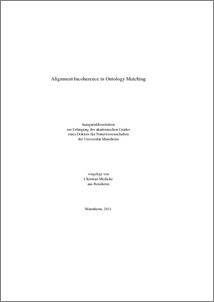|
Alignment Incoherence in Ontology Matching
Meilicke, Christian
![[img]](https://madoc.bib.uni-mannheim.de/style/images/fileicons/application_pdf.png)  Vorschau |
|
PDF
meilicke-dissertation.pdf
- Veröffentlichte Version
Download (1MB)
|
|
URL:
|
https://madoc.bib.uni-mannheim.de/29351
|
|
URN:
|
urn:nbn:de:bsz:180-madoc-293513
|
|
Dokumenttyp:
|
Dissertation
|
|
Erscheinungsjahr:
|
2011
|
|
Ort der Veröffentlichung:
|
Mannheim
|
|
Verlag:
|
Universität Mannheim
|
|
Hochschule:
|
Universität Mannheim
|
|
Gutachter:
|
Stuckenschmidt, Heiner
|
|
Datum der mündl. Prüfung:
|
21 Oktober 2011
|
|
Sprache der Veröffentlichung:
|
Englisch
|
|
Einrichtung:
|
Fakultät für Wirtschaftsinformatik und Wirtschaftsmathematik > Practical Computer Science II: Artificial Intelligence (Stuckenschmidt 2009-)
|
|
Fachgebiet:
|
004 Informatik
|
|
Normierte Schlagwörter (SWD):
|
Information Engineering
|
|
Freie Schlagwörter (Englisch):
|
Ontology Matching , Data Integration , Incoherence , Alignment
|
|
Abstract:
|
Ontology matching is the process of generating alignments between ontologies. An alignment is a set of correspondences. Each correspondence links concepts and properties from one ontology to concepts and properties from another ontology. Obviously, alignments are the key component to enable integration of knowledge bases described by different ontologies. For several reasons, alignments contain often erroneous correspondences. Some of these errors can result in logical conflicts with other correspondences. In such a case the alignment is referred to as an incoherent alignment.
The relevance of alignment incoherence and strategies to resolve alignment incoherence are in the center of this thesis. After an introduction to syntax and semantics of ontologies and alignments, the importance of alignment coherence is discussed from different perspectives. On the one hand, it is argued that alignment incoherence always coincides with the incorrectness of correspondences. On the other hand, it is demonstrated that the use of incoherent alignments results in severe problems for different types of applications.
The main part of this thesis is concerned with techniques for resolving alignment incoherence, i.e., how to find a coherent subset of an incoherent alignment that has to be preferred over other coherent subsets. The underlying theory is the theory of diagnosis. In particular, two specific types of diagnoses, referred to as local optimal and global optimal diagnosis, are proposed. Computing a diagnosis is for two reasons a challenge. First, it is required to use different types of reasoning techniques to determine that an alignment is incoherent and to find subsets (conflict sets) that cause the incoherence. Second, given a set of conflict sets it is a hard problem to compute a global optimal diagnosis. In this thesis several algorithms are suggested to solve these problems in an efficient way.
In the last part of this thesis, the previously developed algorithms are applied to the scenarios of
- evaluating alignments by computing their degree of incoherence;
- repairing incoherent alignments by computing different types of diagnoses;
- selecting a coherent alignment from a rich set of matching hypotheses;
- supporting the manual revision of an incoherent alignment.
In the course of discussing the experimental results, it becomes clear that it is possible to create a coherent alignment without negative impact on the alignments quality. Moreover, results show that taking alignment incoherence into account has a positive impact on the precision of the alignment and that the proposed approach can help a human to save effort in the revision process.
|
 | Dieser Eintrag ist Teil der Universitätsbibliographie. |
 | Das Dokument wird vom Publikationsserver der Universitätsbibliothek Mannheim bereitgestellt. |
 Suche Autoren in Suche Autoren in
Sie haben einen Fehler gefunden? Teilen Sie uns Ihren Korrekturwunsch bitte hier mit: E-Mail
Actions (login required)
 |
Eintrag anzeigen |
|
|
 ORCID: 0000-0002-0198-5396
ORCID: 0000-0002-0198-5396



 Suche Autoren in
Suche Autoren in